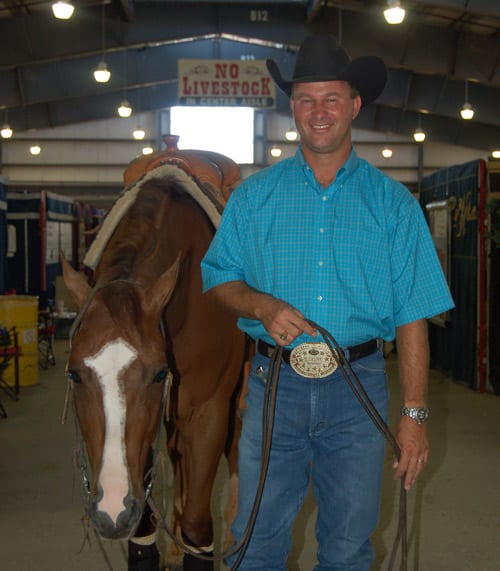Horse shows can be a stressful endeavor. However, exhibitors aren’t the only ones who deal with the pressure of competition. Whether horses travel the country attending shows week after week or are out once a year to win a ribbon at the county show, they can feel the stress of competition, too.
After nearly 30 years riding and showing horses, Bret Parrish — Western pleasure trainer and 2006 All American Quarter Horse Congress Masters Two-Year-Old Western Pleasure Reserve Champion — of Parrish Quarter Horses in Pavo, Ga., knows just how stressful competition can be.
“The actual showing of the horse is the easiest part — it’s the hauling and preparation that are toughest for the horse,” Parrish says. “That’s why we try not to stress the horses too much at one time. We take things slow and spread out the preparation time throughout the day — and even sometimes the night before — so we’re not putting added pressure on the horse.”
In addition to keeping a regular competition routine to help keep his horses relaxed, Parrish also uses ULCERGARD® (omeprazole) to help prevent stomach ulcers before they become a problem.
“ULCERGARD is a great tool for us because if a horse isn’t eating well and feeling good, they’re definitely not going to perform well for us,” Parrish says. “We’ve gotten to where we’ll give our horses a dose of ULCERGARD before we leave and then keep them on it until we come home. We try to guard against stomach ulcers before we ever leave home.”
Parrish says it’s a priority to give his horses products that are thoroughly tested and FDA-approved. The competition is no place to encounter surprises — everything from his horse’s tack to healthcare products must work consistently.
“We have always had a really great response with ULCERGARD,” Parrish says. In addition, Parrish says learning each horse’s tendencies and personality can sometimes make training and showing challenging, but using ULCERGARD to help prevent stomach ulcers makes it easier to keep each horse feeling good and ready to work.
Speaking to riders around the country and world, Parrish knows competitors at all levels can relate to the stress of competitions, even if they don’t spend weeks on the road. In fact, stomach ulcers can occur in up to 63% of nonracing competitive horses.1
“A horse’s stomach can produce up to 16 gallons of acid each day,”2 says April Knudson, DVM, manager, Merial Veterinary Services. “In a natural grazing environment, forage in the stomach helps to create a buffer for the stomach acid. But, when we take horses out of the pasture and into a stall or show, with limited grazing opportunities or little free choice hay, coupled with the stress of the show, acid can build up in the horse’s stomach and lead to stomach ulcers.”
Dr. Knudson adds that horses are extremely sensitive to stress. Even events that many horse owners consider to be routine — including training, traveling, competition and stall confinement3 — can be stressful enough to contribute to stomach ulcer development, sometimes in as little as five days.4
“Horses that show competitively — whether year-round or once a summer — can develop stomach ulcers,” Dr. Knudson says. “But, owners can help keep their horses performing at their best just by using ULCERGARD to help prevent stomach ulcers before they become a problem.”*
*When treated for 8 or 28 days, ULCERGARD is proven to effectively prevent stomach ulcers in horses exposed to stressful conditions.
ULCERGARD® (omeprazole) can be used in horses that weigh at least 600 pounds. The effectiveness of ULCERGARD in the prevention of gastric ulcers in foals and weanlings has not been evaluated. ULCERGARD may be used safely in breeding stallions. Safety in pregnant mares has not been determined.
®ULCERGARD is a registered trademark of the AstraZeneca Group of Companies. ©2009 Merial Limited. Duluth, GA. All rights reserved. EQUIUGD950 (8/09).
1Mitchell RD. Prevalence of gastric ulcers in hunter/jumper and dressage horses evaluated for poor performance. Association for Equine Sports Medicine, September 2001.
2Kitchen DL, Merritt AM, Burrow JA. Histamine-induced gastric acid secretion in horses. AJVR 1998;59(10):1303-1306.
3ULCERGARD product label.
4McClure SR, Carithers DS, Gross SJ, Murray MJ. Gastric ulcer development in horses in a simulated show or training environment. J Am Vet Med Assoc 2005;227(5):775-777.









